Catégories
Auteur/autrice : admin7524
Catégories
Religions et Pouvoirs-en
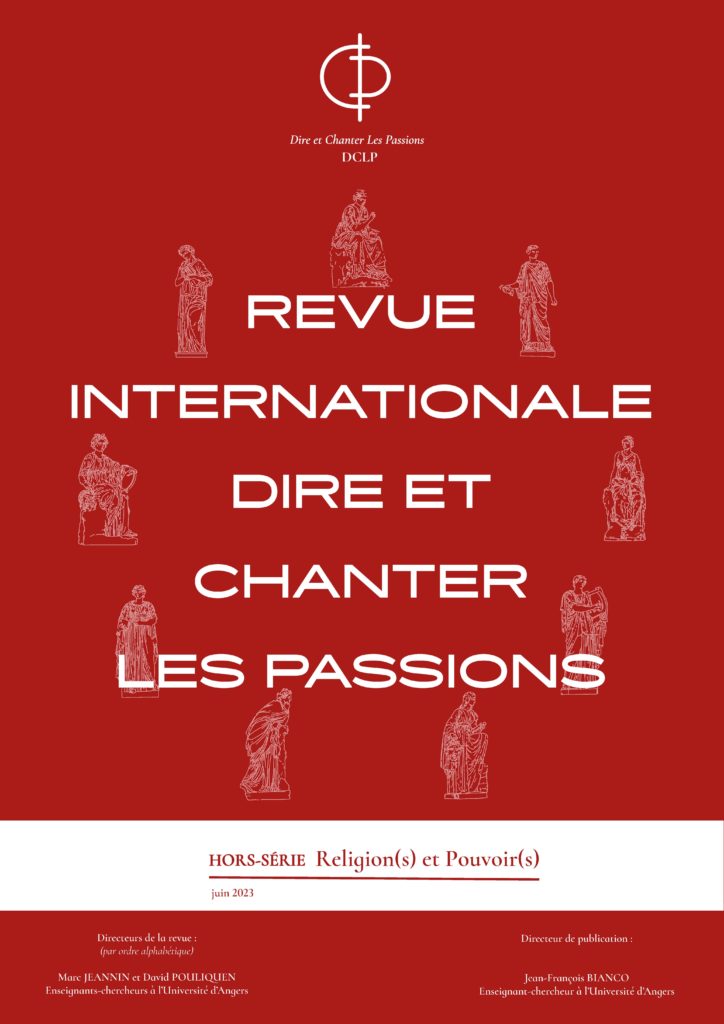
Religion(s) et Pouvoir(s)
N° Hors-série (2023)
Publication date : June 2023
Online release date : July 2023
Publication date : June 2023
Online release date : July 2023
| Édito | David POULIQUEN |
|---|---|
| Download PDF | |
| Rome-Angers. Hommage à Philippe Levillain | Hervé YANNOU |
| Download PDF | |
| Approche de la psychologie religieuse | Marie NGO NKANA |
| Download PDF | |
| Les histoires ecclésiastiques du Ve siècle | Matteo ANTONIAZZI |
| Download PDF | |
| Edmund Burke on Church Status | Norbert COL |
| Download PDF | |
| Napoléon Bonaparte et les religions | Gildard GUILLAUME |
| Download PDF | |
| Léo Strauss et la critique du sionisme politique | Carlo ALTINI |
| Download PDF | |
| Le Vin et l’Église en Anjou | Pierre AGUILAS & Jean-Louis ROBIN |
| Download PDF | |
| Voix divines et puissantes | Marc JEANNIN |
| Download PDF | |
Editors of the journal (alphabetically)
Dr Marc JEANNIN, Université of Angers ;
Dr David POULIQUEN, DCLP
Publisher
Dr Jean-François BIANCO, , Université of Angers
| Scientific Direction (alphabetically) | |
| Prof. Matteo CASARI | Alma Master Studiorum – Università di Bologna |
|---|---|
| Pr Adrian GRAFE | Université d’Artois |
| Pr Danièle PISTONE | Université Paris-Sorbonne |
| Scientific Committee (alphabetically) | |
| Prof. Angela ALBANESE | Università degli Studi Modena e Reggio Emilia |
| Pr Carlo ALTINI | Università degli Studi Modena e Reggio Emilia |
| Pr Patrick BARBAN | Université du Havre |
| Pr Marina BONDI | Università degli Studi Modena e Reggio Emilia, Conservatorio di Musica Vecchi Tonelli |
| Pr Philippe BLAUDEAU | Université d’Angers |
| Dr Jean-Noël CASTORIO | Université du Havre |
| Fabio CEPPELLI | Teatro Luciano Pavarotti |
| Pr Carole CHRISTEN | Université du Havre |
| Dr Golda COHEN | Université d’Angers |
| Pr Norbert COL | Université de Bretagne Sud |
| Pr Carl GOMBRICH | The London Interdisciplinary School |
| Me. Gildard GUILLAUME | Académie des Sciences, Belles-Lettres et Arts |
| Simon LEADER | The Leys School |
| Dr Marie NGO NKANA | Université de Strasbourg |
| Jean-Yves LEJUGE | Festival de musique baroque de Quelven |
| Prof. Nicola PASQUALICCHIO | Università di Verona |
| Dr Paul PHILLIPS | Stanford University |
| Dr Geoffrey RATOUIS | Université d’Angers |
| Dr Sophie ROCH-VEIRAS | Université Catholique de l’Ouest |
| Pr Clair ROWDEN | School of Musicologie Cardiff University |
Legal Advisor: Amandine : Amandine GAULTIER
Équipe éditoriale :
- Editorial Section :
- Graphic Design Section : Allison LEGRAVE
Marine VASLIN
Lisa FISCHER
Marjorie GRANDIS
Languages of publication: French, Italian, English
@ : contact-revue-dclp@dclp.eu
ISSN : 2804-0074
Legal deposit: February 2021
@ : contact-revue-dclp@dclp.eu
ISSN : 2804-0074
Legal deposit: February 2021
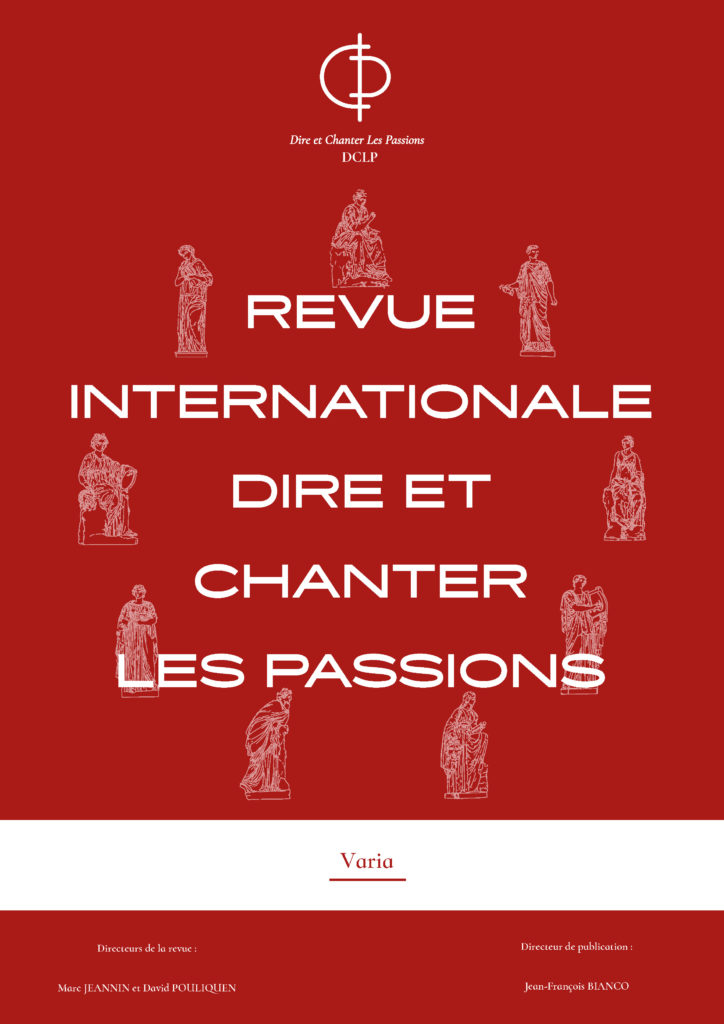
VARIA
| « BERLIOZ, L’ÉCRIVAIN » | Guy TRIGALOT |
|---|---|
| Download PDF | |
| « JAZZ MUSIC IN KEROUAC’S ON THE ROAD » | Marc JEANNIN |
| Download PDF | |
Editors of the journal (alphabetically)
Dr Marc JEANNIN, Université of Angers ;
Dr David POULIQUEN, DCLP
Publisher
Dr Jean-François BIANCO, , Université of Angers
| Scientific Direction (alphabetically) | |
| Prof. Matteo CASARI | Alma Master Studiorum – Università di Bologna |
|---|---|
| Pr Adrian GRAFE | Université d’Artois |
| Pr Danièle PISTONE | Université Paris-Sorbonne |
| Scientific Committee (alphabetically) | |
| Prof. Angela ALBANESE | Università degli Studi Modena e Reggio Emilia |
| Pr Carlo ALTINI | Università degli Studi Modena e Reggio Emilia |
| Pr Patrick BARBAN | Université du Havre |
| Pr Marina BONDI | Università degli Studi Modena e Reggio Emilia, Conservatorio di Musica Vecchi Tonelli |
| Pr Philippe BLAUDEAU | Université d’Angers |
| Dr Jean-Noël CASTORIO | Université du Havre |
| Fabio CEPPELLI | Teatro Luciano Pavarotti |
| Pr Carole CHRISTEN | Université du Havre |
| Dr Golda COHEN | Université d’Angers |
| Pr Norbert COL | Université de Bretagne Sud |
| Pr Carl GOMBRICH | The London Interdisciplinary School |
| Me. Gildard GUILLAUME | Académie des Sciences, Belles-Lettres et Arts |
| Simon LEADER | The Leys School |
| Dr Marie NGO NKANA | Université de Strasbourg |
| Jean-Yves LEJUGE | Festival de musique baroque de Quelven |
| Prof. Nicola PASQUALICCHIO | Università di Verona |
| Dr Paul PHILLIPS | Stanford University |
| Dr Geoffrey RATOUIS | Université d’Angers |
| Dr Sophie ROCH-VEIRAS | Université Catholique de l’Ouest |
| Pr Clair ROWDEN | School of Musicologie Cardiff University |
Legal Advisor: Amandine : Amandine GAULTIER
Équipe éditoriale :
- Editorial Section :
- Graphic Design Section : Allison LEGRAVE
Marine VASLIN
Lisa FISCHER
Marjorie GRANDIS
Languages of publication: French, Italian, English
@ : contact-revue-dclp@dclp.eu
ISSN : 2804-0074
Legal deposit: February 2021
@ : contact-revue-dclp@dclp.eu
ISSN : 2804-0074
Legal deposit: February 2021
Catégories
DCLP num 3
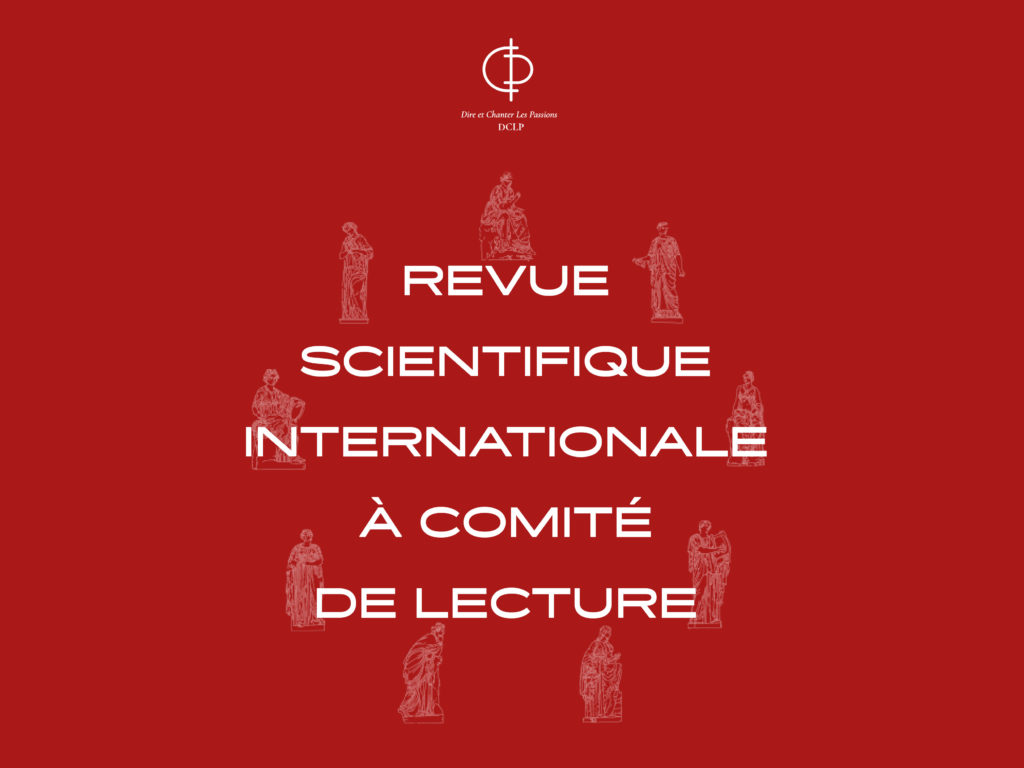
L’Émotion chez Maria Callas
N°3 (2024)
Publication date : September 2024
Online publication date : 2 December 2024
Publication date : September 2024
Online publication date : 2 December 2024
TABLE OF CONTENTS
| Introduction | |
| 1. The Love, Art, and Life of a Woman | 2. Emotion and Inspiration | 3. Heart and Analysis |
| About the Authors | |
| Introduction by Jean-François Bianco and Marc Jeannin | |
| « Introduction » | Jean-François Bianco and Marc Jeannin |
|---|---|
| Download PDF | |
| 1. The Love, Art, and Life of a Woman | |
| « Maria Callas, le triomphe de la volonté » | Aurélie Moreau |
| Download PDF | |
| « Maria Callas, le destin d’une diva » | Eulalie Giraud |
| Download PDF | |
| 2. Emotion and Inspiration | |
| « “Oh là là ! Il se prend pour la Callas” » | Stéphane Sénéchal |
| Download PDF | |
| 3. Heart and Analysis | |
| « The Callas effect: how a soprano changed the opera » | Diana Elizabeth Martinovich |
| Download PDF | |
| « Maria Callas and the craft of emotion » | Craig Wich and Kelly Hijleh |
| Download PDF | |
| About the Authors | |
Directeurs de la revue (par ordre alphabétique)
Dr Marc JEANNIN, Université d’Angers ;
Dr David POULIQUEN, DCLP
Directeur de la publication
Dr Jean-François BIANCO, Université d’Angers
| Direction scientifique (par ordre alphabétique) | |
| Prof. Matteo CASARI | Alma Master Studiorum – Università di Bologna |
|---|---|
| Pr Adrian GRAFE | Université d’Artois |
| Pr Danièle PISTONE | Université Paris-Sorbonne |
| Comité scientifique (par ordre alphabétique) | |
| Prof. Angela ALBANESE | Università degli Studi Modena e Reggio Emilia |
| Pr Carlo ALTINI | Università degli Studi Modena e Reggio Emilia |
| Pr Patrick BARBAN | Université du Havre |
| Pr Marina BONDI | Università degli Studi Modena e Reggio Emilia, Conservatorio di Musica Vecchi Tonelli |
| Pr Philippe BLAUDEAU | Université d’Angers |
| Dr Jean-Noël CASTORIO | Université du Havre |
| Fabio CEPPELLI | Teatro Luciano Pavarotti |
| Pr Carole CHRISTEN | Université du Havre |
| Dr Golda COHEN | Université d’Angers |
| Pr Norbert COL | Université de Bretagne Sud |
| Pr Carl GOMBRICH | The London Interdisciplinary School |
| Me. Gildard GUILLAUME | Académie des Sciences, Belles-Lettres et Arts |
| Simon LEADER | The Leys School |
| Dr Marie NGO NKANA | Université de Strasbourg |
| Jean-Yves LEJUGE | Festival de musique baroque de Quelven |
| Prof. Nicola PASQUALICCHIO | Università di Verona |
| Dr Paul PHILLIPS | Stanford University |
| Dr Geoffrey RATOUIS | Université d’Angers |
| Dr Sophie ROCH-VEIRAS | Université Catholique de l’Ouest |
| Pr Clair ROWDEN | School of Musicologie Cardiff University |
Conseillère juridique : Amandine GAULTIER
Équipe éditoriale :
- Volet édition :
- Volet graphique-design : Allison LEGRAVE
Marine VASLIN
Lisa FISCHER
Marjorie GRANDIS
Publication languages : French, Italian, English
@ : contact-revue-dclp@dclp.eu
ISSN : 2804-0074
Legal deposit : February 2021
@ : contact-revue-dclp@dclp.eu
ISSN : 2804-0074
Legal deposit : February 2021
Catégories
DCLP num 2
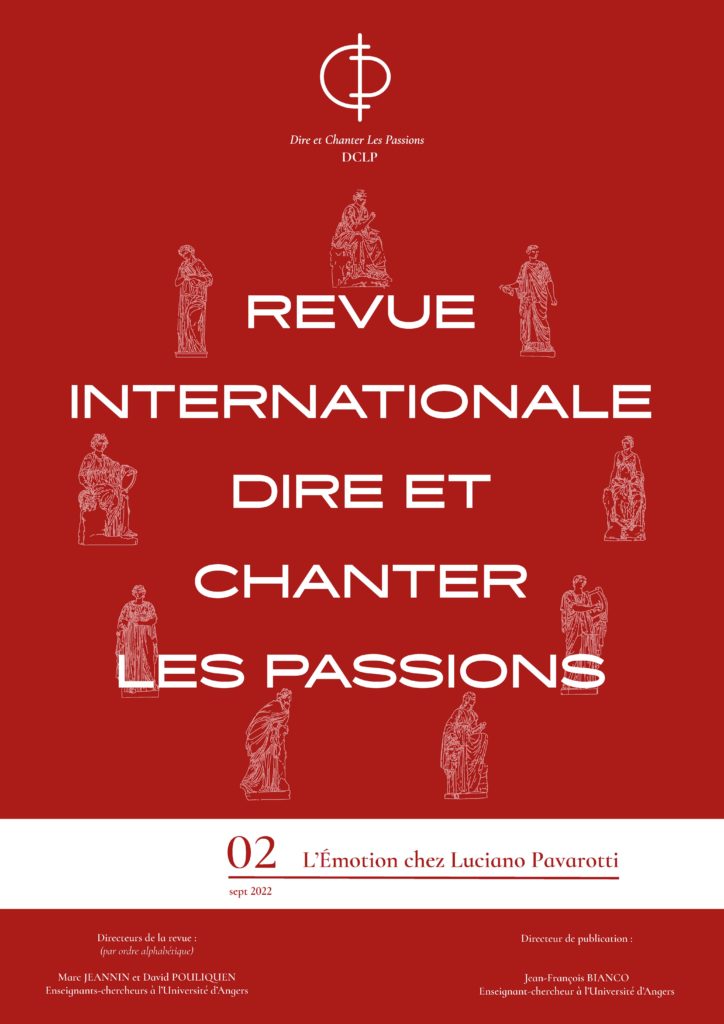
L’Émotion chez Luciano Pavarotti
N° 2 (2022)
Publication date : Septembre 2022
Online release date: May 2024
Publication date : Septembre 2022
Online release date: May 2024
Editors of the journal (alphabetically)
Dr Marc JEANNIN, Université of Angers ;
Dr David POULIQUEN, DCLP
Publisher
Dr Jean-François BIANCO, , Université of Angers
| Scientific Direction (alphabetically) | |
| Prof. Matteo CASARI | Alma Master Studiorum – Università di Bologna |
|---|---|
| Pr Adrian GRAFE | Université d’Artois |
| Pr Danièle PISTONE | Université Paris-Sorbonne |
| Scientific Committee (alphabetically) | |
| Prof. Angela ALBANESE | Università degli Studi Modena e Reggio Emilia |
| Pr Carlo ALTINI | Università degli Studi Modena e Reggio Emilia |
| Pr Patrick BARBAN | Université du Havre |
| Pr Marina BONDI | Università degli Studi Modena e Reggio Emilia, Conservatorio di Musica Vecchi Tonelli |
| Pr Philippe BLAUDEAU | Université d’Angers |
| Dr Jean-Noël CASTORIO | Université du Havre |
| Fabio CEPPELLI | Teatro Luciano Pavarotti |
| Pr Carole CHRISTEN | Université du Havre |
| Dr Golda COHEN | Université d’Angers |
| Pr Norbert COL | Université de Bretagne Sud |
| Pr Carl GOMBRICH | The London Interdisciplinary School |
| Me. Gildard GUILLAUME | Académie des Sciences, Belles-Lettres et Arts |
| Simon LEADER | The Leys School |
| Dr Marie NGO NKANA | Université de Strasbourg |
| Jean-Yves LEJUGE | Festival de musique baroque de Quelven |
| Prof. Nicola PASQUALICCHIO | Università di Verona |
| Dr Paul PHILLIPS | Stanford University |
| Dr Geoffrey RATOUIS | Université d’Angers |
| Dr Sophie ROCH-VEIRAS | Université Catholique de l’Ouest |
| Pr Clair ROWDEN | School of Musicologie Cardiff University |
Legal Advisor: Amandine : Amandine GAULTIER
Équipe éditoriale :
- Editorial Section :
- Graphic Design Section : Allison LEGRAVE
Marine VASLIN
Lisa FISCHER
Marjorie GRANDIS
Languages of publication: French, Italian, English
@ : contact-revue-dclp@dclp.eu
ISSN : 2804-0074
Legal deposit: February 2021
@ : contact-revue-dclp@dclp.eu
ISSN : 2804-0074
Legal deposit: February 2021
Catégories
DCLP num 1
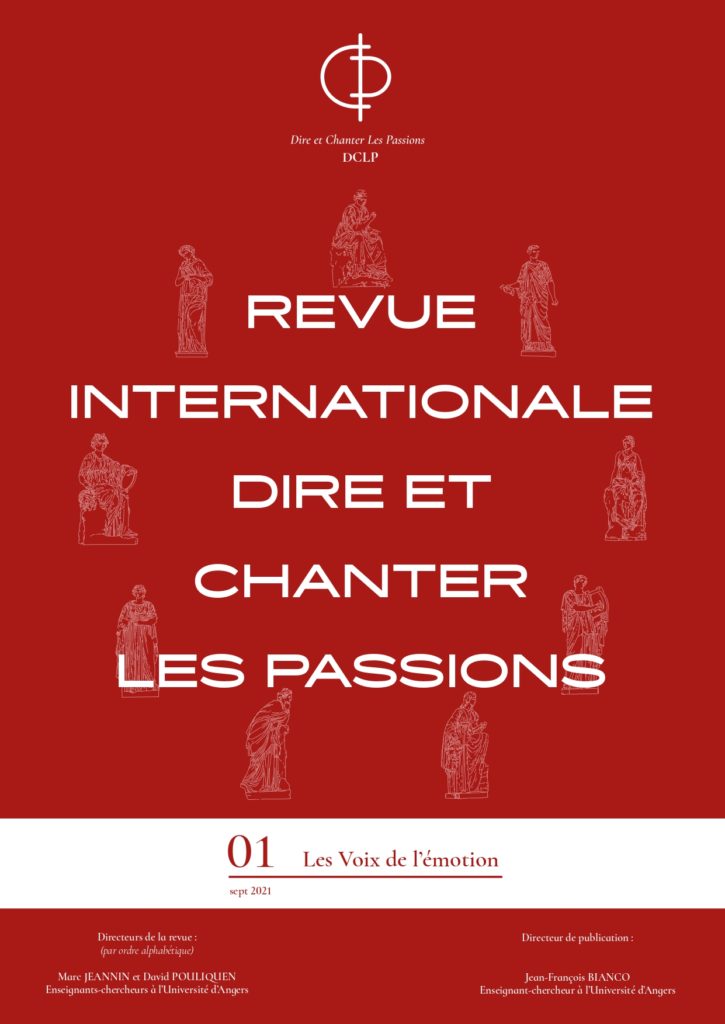
Les Voix de l’émotion
N° 1 (2021)
Publication date : Septembre 2021
Online release date : Décembre 2021
Publication date : Septembre 2021
Online release date : Décembre 2021
Editors of the journal (alphabetically)
Dr Marc JEANNIN, Université of Angers ;
Dr David POULIQUEN, DCLP
Publisher
Dr Jean-François BIANCO, , Université of Angers
| Scientific Direction (alphabetically) | |
| Prof. Matteo CASARI | Alma Master Studiorum – Università di Bologna |
|---|---|
| Pr Adrian GRAFE | Université d’Artois |
| Pr Danièle PISTONE | Université Paris-Sorbonne |
| Scientific Committee (alphabetically) | |
| Prof. Angela ALBANESE | Università degli Studi Modena e Reggio Emilia |
| Pr Carlo ALTINI | Università degli Studi Modena e Reggio Emilia |
| Pr Patrick BARBAN | Université du Havre |
| Pr Marina BONDI | Università degli Studi Modena e Reggio Emilia, Conservatorio di Musica Vecchi Tonelli |
| Pr Philippe BLAUDEAU | Université d’Angers |
| Dr Jean-Noël CASTORIO | Université du Havre |
| Fabio CEPPELLI | Teatro Luciano Pavarotti |
| Pr Carole CHRISTEN | Université du Havre |
| Dr Golda COHEN | Université d’Angers |
| Pr Norbert COL | Université de Bretagne Sud |
| Pr Carl GOMBRICH | The London Interdisciplinary School |
| Me. Gildard GUILLAUME | Académie des Sciences, Belles-Lettres et Arts |
| Simon LEADER | The Leys School |
| Dr Marie NGO NKANA | Université de Strasbourg |
| Jean-Yves LEJUGE | Festival de musique baroque de Quelven |
| Prof. Nicola PASQUALICCHIO | Università di Verona |
| Dr Paul PHILLIPS | Stanford University |
| Dr Geoffrey RATOUIS | Université d’Angers |
| Dr Sophie ROCH-VEIRAS | Université Catholique de l’Ouest |
| Pr Clair ROWDEN | School of Musicologie Cardiff University |
Legal Advisor: Amandine : Amandine GAULTIER
Équipe éditoriale :
- Editorial Section :
- Graphic Design Section : Allison LEGRAVE
Marine VASLIN
Lisa FISCHER
Marjorie GRANDIS
Languages of publication: French, Italian, English
@ : contact-revue-dclp@dclp.eu
ISSN : 2804-0074
Legal deposit: February 2021
@ : contact-revue-dclp@dclp.eu
ISSN : 2804-0074
Legal deposit: February 2021
Catégories
Charte éditoriale-en
EDITORIAL GUIDELINES
REVUE DCLP
GENERAL GUIDELINES FOR SUBMITTED FILES
- The submitted file, containing the complete article with text, illustrations, and any tables in their proper places, must be saved in Word format (.doc or .docx file).
The file should be named as follows: « First name and Last name of the author, followed by a space, a hyphen, another space, and the Title of the article. » Example: « Jean Dupont – The Voices of Emotion » - DCLP primarily publishes articles in French, English, or Italian. The editorial charter guidelines primarily apply to articles in French. Texts written in other languages should follow the main recommendations (font, line spacing, titles, paragraphs) to maintain publication consistency but may adopt their respective conventions for specific details.
- Authors should submit the following along with their file:
– A biography of the author (100-150 words)
– A summary in the article’s language (maximum 500 characters, including spaces)
– A list of three to five keywords for indexing - The maximum length for submitted articles is 50,000 characters (including spaces), excluding notes, references, and appendices.
- Authors must place any illustrations within the text file at the intended location. Illustrations should be referred to as « Figure n. » Authors are responsible for obtaining reproduction rights if necessary.
- Tables must be created within the Word document.
ARTICLE PRESENTATION
- Font, Line Spacing, and Text Size
The font is « Garamond, » with a line spacing of 1.
– Body text: 12 pt, justified
– Long quotations (more than two lines): 10 pt, Roman characters, reduced justification (2 cm margins on each side)
– Figure and table captions: 10 pt, italics, justified
– Footnotes: 10 pt, justified - Titles
– Article title: 16 pt, uppercase, bold, centered
Should not exceed 100 characters
– Author’s first and last name under the title: 12 pt, centered
– Author’s position/profession and institution (if applicable): 12 pt, centered, below the name
– First-level subheading: 12 pt, uppercase, centered
– Second-level subheading: 12 pt, italics, left-aligned - Paragraphs
– Paragraphs should be distinguished with a right-indent of 1 cm.
– Bullet points should be avoided; use dashes instead. - Quotations
– Long quotations (more than two lines) should be separated (on a new line) and distinguished with a smaller font size (10 pt) and reduced justification. They should be in Roman characters, not italics, and should not include quotation marks. Omissions should be indicated with brackets and three ellipsis points […].
– Short quotations (less than two lines) should be included in the text in Roman characters and enclosed within French quotation marks. English quotation marks should be used for quotes within quotes. - Italics
Italics should be used for:
– Book titles,
– Works of art,
– Emphasized words. - Special Typographic Rules
– Capital letters should be accented.
– Authors’ first names should appear in full. - Rules for Titles of Books, Publications, and Journals
– If the title does not begin with a definite article, only the first word is capitalized.
– If the title begins with a definite article, the first noun and any preceding adjectives or adverbs are capitalized.
– If the title contains contrast or symmetry, each term is capitalized.
– If the title is a full sentence, no capitalization is used.
BIBLIOGRAPHIC REFERENCES AND NOTES
- The DCLP journal requires references to be cited in footnotes.
A final bibliography is not required. - Notes should be numbered consecutively, with each note ending in a period.
- Footnote markers should be placed before any punctuation mark.
- References should follow French bibliographic standards in the following format:
First Name Last Name, “Article Title,” Title of the Book, Collection, or Journal, (first edition date if applicable), Place of Publication, Publisher, “Collection,” Edition Date, and any relevant edition details. - Specific Recommendations
– The city name (place of publication) should be in French.
– Use “dans” instead of “in” for references.
– References in languages other than French should follow the conventions of the respective language.
– Use “voir” for cross-references. - Online References
– The consultation date should be indicated with “Site consulted on (date).”
COMMON ABBREVIATIONS
XIVth century (Roman numerals in small caps)
« XIVth century » (Roman numerals in small caps)
« Art. cit. » for « cited article »
« Chap. » instead of « ch. »
« éd. » (editor, edition)
« etc. » and not « etc… »
« vol. » for volume
« t. » for tome
« coll. » for collection
« fasc. » for fascicle
« f° » for folio
« n° » for number
« p. » for page (avoid « pp. » for multiple pages)
« tr. fr. » for French translation
« sq. » for « and following »
Ibid. refers to the same text as the previous note
Id. refers to the same author
Op. cit. refers to a previously cited reference
Catégories
auteurs-hs
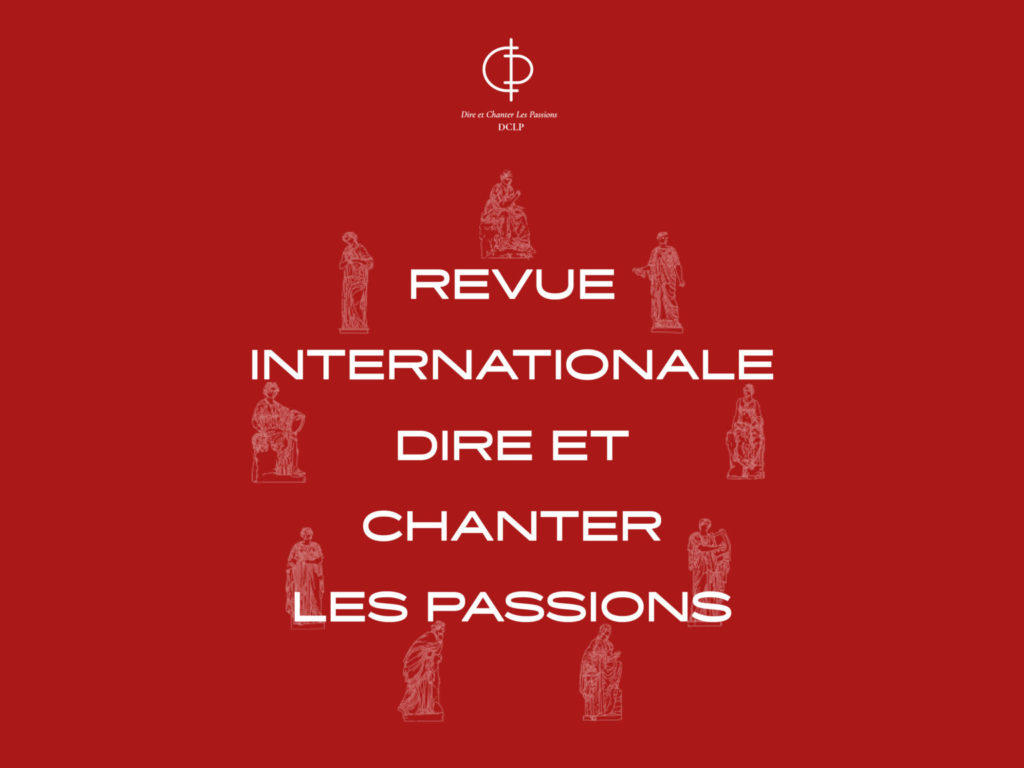
SPECIAL ISSUES
Revue DCLP
ABOUT THE AUTHORS (in alphabetical order)Norbert COL
Norbert COL, Emeritus Professor at the University of Southern Brittany and member of TEMOS UMR 9016 CNRS, is the author of a bilingual edition of Edmund Burke’s Appeal from the New to the Old Whigs (1996), Burke, the Social Contract, and Revolutions (2001), and In Search of British Conservatism: Historiography, Britishness, Modernity. 17th-20th centuries (2007), all published by the University Press of Rennes. He directed Writings of the Self (L’Harmattan, 2007) and co-directed, with Allan Ingram, Utopia, Individual, and Society: Sociability in Question (Le Manuscrit, 2015). He has also written various articles, mainly on Burke, Michael Oakeshott, Jonathan Swift, Daniel Defoe, and Thomas More.Gildard GUILLAUME
Graduated in private law and from the Center for Business Improvement in Paris (EMBA-HEC), Gildard Guillaume is an honorary lawyer, writer, and historian. He is an administrator of the Napoleon Institute and the Academy of Sciences, Fine Arts, and Letters of Angers. In addition to articles in specialized journals, he has published several essays and historical novels concerning the period 1780-1880, particularly the Revolution, the Consulate, and the First Empire. He gives lectures and participates in the work of several historical associations. He chairs a foundation for the restoration of a public historical monument.Marc JEANNIN
Lecturer at the University of Angers and Doctor of Letters from the University of the Sorbonne, Marc Jeannin is passionate about the voice and specializes in language-music relationships. His work focuses on vocal expression related to emotions and sensory perceptions. Author of scientific articles and press articles, he has also published several interdisciplinary books, including Anthony Burgess: Music in Literature and Literature in Music (Cambridge Scholars Publishing, 2009), Anthony Burgess and France (Cambridge Scholars Publishing, 2017), Anthony Burgess and France (University Press of Rennes, 2019), and Phonetic Accent and Musical Accent in Vocal Music in English (European University Editions, 2019). Marc Jeannin is also a composer and member of SACEM.David POULIQUEN
Doctor of Music, graduated from the University of Rennes 2, and Doctor of Human Sciences, graduated from the University of Modena and Reggio Emilia, David Pouliquen is interested in the relationships between music, languages, theater, and voice. A specialist in Shakespeare at the opera, his work deals with musical and comparative dramaturgy. His methodological approach is based on linking academic research with artistic practices (singing, acting, staging). This originality stems from his training as a lyric artist. David Pouliquen is a student of Richard Cowan and Michèle Command.
VARIA
Revue DCLP
ABOUT THE AUTHORSGuy TRIGALOT
Doctor in French literature, language, and civilization, member of the Groupe Hugo (Université Paris Cité) and CIRPaLL (Université d’Angers), Guy Trigalot conducts research on Romantic authors, the Pavie family from Anjou, and the early stages of the press in the 19th century. He has authored around thirty publications, including two books published by PUR, and has delivered as many presentations or study days on these topics. A retired professor specialized in psychopedagogy, he is a member of the Academy of Sciences, Humanities, and Arts of Angers, the scientific and administrative councils of Lyriades de la langue française, co-founder and president of Amis de Victor et Théodore Pavie, and above all a lecturer and exhibition curator at the Maison Littéraire de Victor Hugo in Bièvres.
Catégories
auteurs-nt

